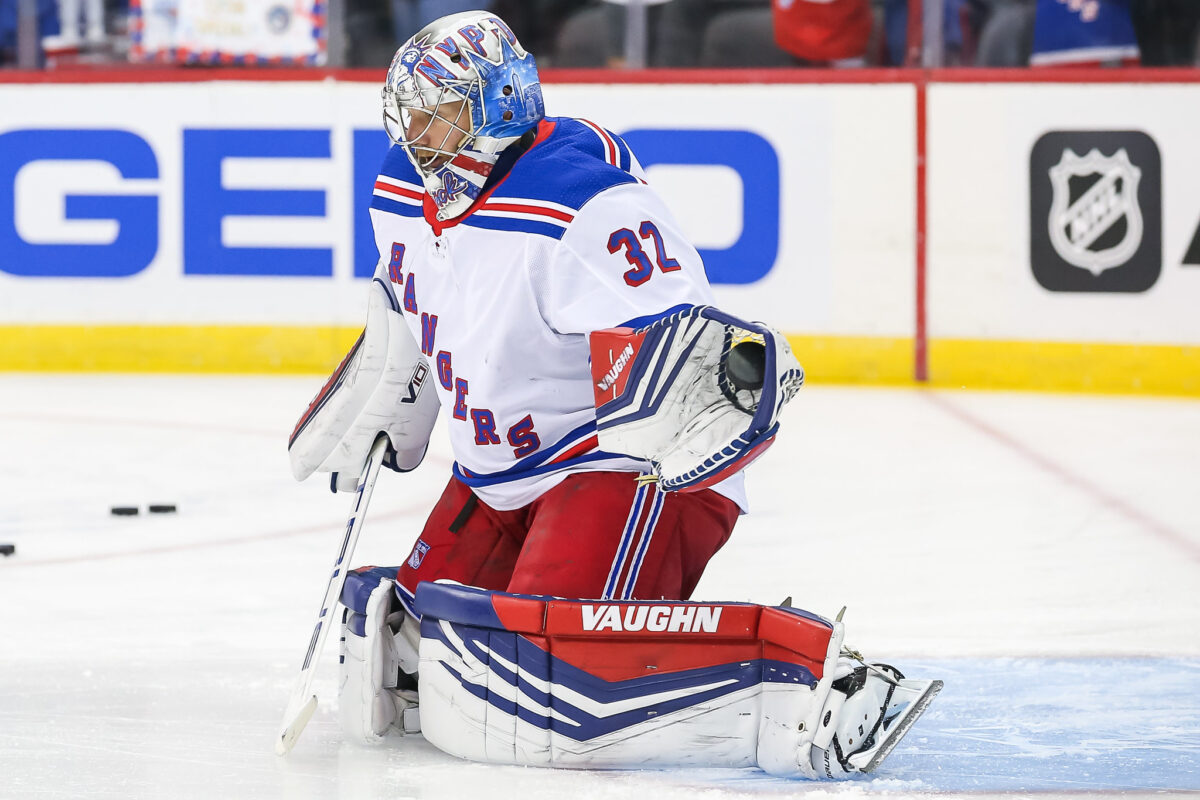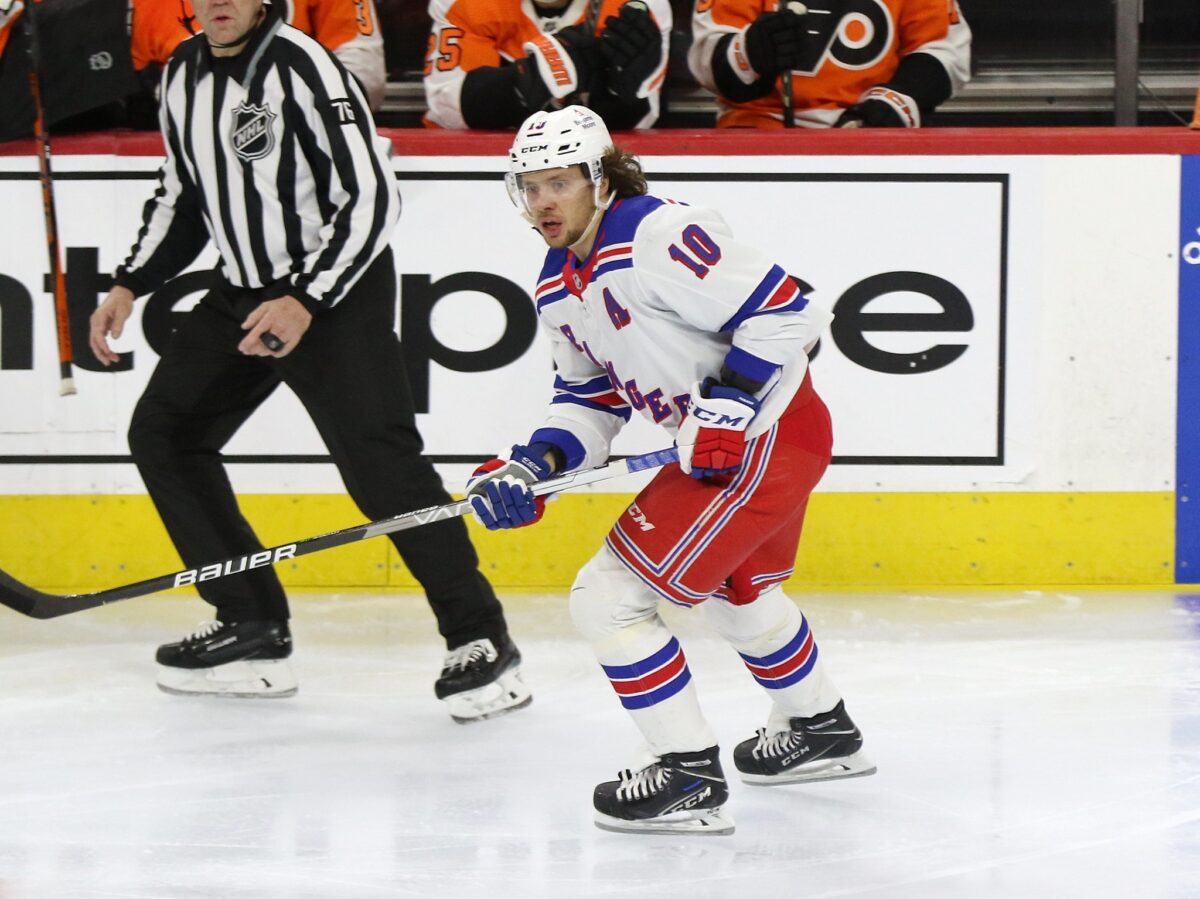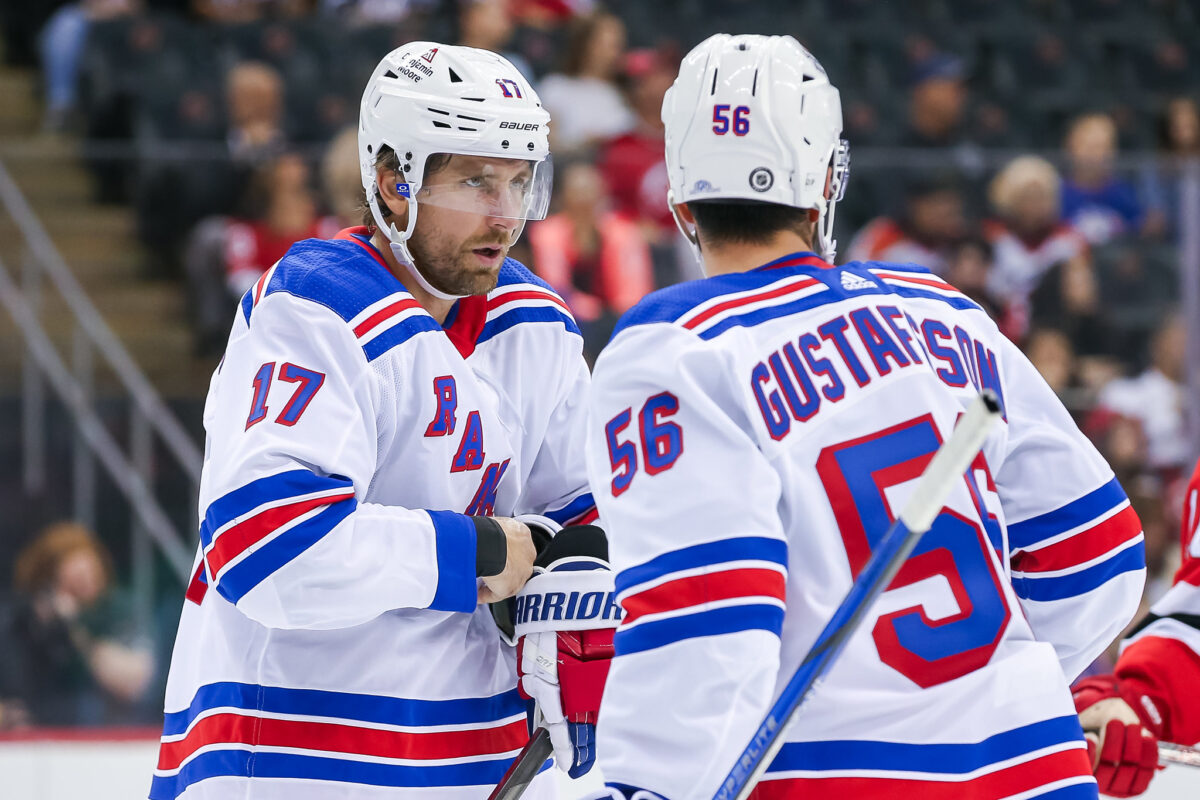Positives abounded from the New York Rangers’ just-completed historic road trip, in which they swept five games for the first time in franchise history: A scorching power play and lockdown penalty killing. Predictably elite work in net from Igor Shesterkin, and surprisingly elite-looking form from 37-year-old backup Jonathan Quick. Artemi Panarin and Chris Kreider continuing their outstanding starts to the season, and Alexis Lafreniere appearing as engaged and effective as he’s been in his three-plus NHL seasons.
If there was one overarching theme that defined the swing through the Western United States and Canada, though, it was resilience – a quality that was notoriously absent at the disastrous conclusion of their 2022-23 season.
Over the past week and a half, the Rangers held fast through opponents’ flurries late in games and overtimes. They overcame deficits and some ill-timed penalties (and at least one phantom call against), and took advantage of breaks on the ice and used their power play to deliver timely goals. In short, they looked like a team capable of weathering the storm and rising to the moment, neither of which they were able to do in last spring’s seven-game crash out of the first round of the playoffs against the New Jersey Devils.

“I can say it now: Everyone wants to go home,” a smiling Mika Zibanejad said after his OT goal with 26 seconds left sent the Blueshirts to a 3-2 victory over the Winnipeg Jets on Oct. 30, closing out a nine-day trip than ran mostly through cold and snowy Canada. “Everyone wants to go home. But we were determined to finish it off in the right way and I thought we did.”
The Rangers battled through an early Seattle Kraken goal and arena lighting problems for a 4-1 win to open the road jaunt Oct. 21. They survived some sloppy defensive coverage that drew new coach Peter Laviolette’s ire in a 3-0 win over the Connor McDavid-less Edmonton Oilers on Oct. 26. Outshot by a combined 11-3 in overtime by the Vancouver Canucks on Oct. 28 and the Jets, the Rangers took both games, thanks to clutch stops from Shesterkin and winning goals by K’Andre Miller and Zibanejad.
New Coaching Staff Forging New Blueshirts Identity
The Rangers scored three power-play goals against the Canucks, two in the second period, to take a one-goal lead before allowing the equalizer with under five minutes remaining, then bounced back to win the game in the extra period. The Jets appeared to be in prime position to deal the Blueshirts their first loss of the trip when Ryan Lindgren was called for tripping with 19 seconds left in regulation. Replays showed that Lindgren never made any contact with the Winnipeg player.
Latest THW Headlines
The Rangers persevered again, however, coming through with an outstanding penalty kill, most of which was four-on-three during the OT, before Zibanejad converted Artemi Panarin’s nifty cross-ice feed for a one-timer that ended it and pushed their record to 7-2-0.
“Whenever there’s a new coaching staff, I guess in my previous experiences, you want to try to build and find that trust of your identity and who you are and what you’re bringing every night,” captain Jacob Trouba said. “I think that Nashville game (a listless 4-1 home loss Oct. 19) was something that – not an eye-opener – but yeah we still got to figure out what makes us us. And I think we did a good job of it this road trip and we’re kind of figuring out the right recipe for us to win games.” (From ‘Rangers Complete Historic Road Trip With Gutsy OT Win Over Jets’, New York Post, 10/30/23)

That new coaching staff’s work might represent the best guess as to why this edition of the Rangers looks more durable in the early going than in recent seasons. The Blueshirts asked for more structure and on-ice guidance this offseason than they were getting from Gerard Gallant, which led in part to the firing of the coach and Laviolette being hired to replace him.
Laviolette has delivered, installing a 1-3-1 defensive system that acts as something of a neutral-zone trap. That system, proven through his other coaching stops that included three trips to the Stanley Cup Final (one win with the Carolina Hurricanes in 2006), should eventually lead to consistent turnovers by opponents and the opportunity to counterattack through the neutral zone. While that’s not happening frequently yet as the club works to pick up on the nuances, the presence of a more regimented approach does seem to be serving as a source of confidence, with a roster of many established veterans surprisingly eager to embrace a substantially different way of playing than in the past.
The Rangers seem secure in the ability to fall back on the system, and the team defensive numbers back up the notion that they are doing so. They rank first in the NHL in shots against per 60 minutes, second in scoring chances against per 60 and fifth in goals-against per 60 at five-on-five.

The air of calm and self-assuredness that appeared to grow during the trip might stem from other factors as well. The power play was at 34.4 percent after the road swing, second in the NHL. The Rangers are 10th in the league in penalty killing at 83.9. Panarin chugs along piling up points, his 15 tied for third overall. Shesterkin, who made a pair of brilliant saves in overtime to preserve the victory in Vancouver, is still Shesterkin, and the eye-opening performances by Quick – he’s stopped 56 of 57 shots in his two starts after looking lost in the preseason – should only add to the sense of solidity in goal for the guys in front of the tandem.
Rangers Have Room to Rise Offensively
To be sure, an October road trip isn’t the same as facing down the speedy, talented Devils in the postseason. The Rangers took the first two games of that first-round series, but New Jersey adjusted and effectively punched the Blueshirts in the mouth, winning the next three contests by a combined 9-2. The Rangers righted themselves temporarily by taking Game 6 by a 5-2 score, but were noncompetitive in a 4-0 defeat in the finale.
That team seemed lost at times, unsure of what to do when the going got tough. This group, at least early on, seems more certain about how to stay in it when that happens, how to bounce back when things don’t go their way. That’s surely due at least somewhat to Laviolette and his coaching staff, and perhaps also to a team growing from past experiences.
Related: Rangers Need More From Struggling Blake Wheeler
What should also evoke confidence from these Rangers – along with the fact that they have yet to fully master Laviolette’s approach, no small matter as they look to keep rolling – is the appearance that there’s plenty of room for offensive growth. Zibanejad went the first seven games without a goal despite piling up chances, finally breaking through with a tally in each of the last two contests, perhaps signaling that he’s about to go on one of his characteristic scoring binges. Filip Chytil, for as impressive as he’s looked in recording six assists as Panarin’s center, has yet to record a goal.

Blake Wheeler has gotten off to a slow start with his new team and remains pointless, but he looked better in the last three games of the trip. Lafreniere, Kaapo Kakko and rookie Will Cuylle are works in progress with higher ceilings, and Vincent Trocheck has only one goal so far in taking on a checking role centering the third line.
The Blueshirts begged management for help after the playoff disaster last spring. They got it in Laviolette, who was tasked with getting veteran stars to buy in to a new way of playing. That the Rangers, who were developing a deserved reputation as a tough group to coach over the past several seasons, have so earnestly worked to do so is borderline remarkable. It’s also lent heft to their 2022-23 exit interview claims that they required more direction to unlock their full potential.
The path will get more difficult in short order, the Rangers sure to face additional adversity rather quickly. Their newfound resilience will be tested. It won’t take long to find out just how tenacious these 2023-24 Blueshirts have become.
